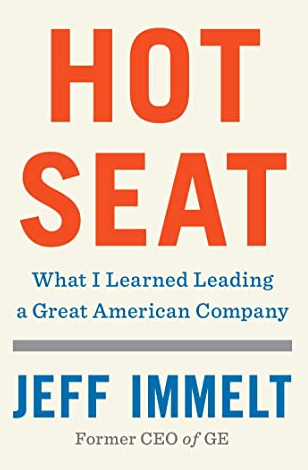Jeff Immelt was CEO of General Electric (GE), a massive operating conglomerate he shares some of his wisdom. Interestingly GE was made in 1892 by the famous inventor Thomas Edison. One of the challenges of leading a conglomerate is its complexity, he tried to simplify this. How do you get the best out of complexity without being complex?
The best leaders absorb fear, not only giving people the truth but also giving them a way forward. Transparency is an admirable goal. But the real goal is to solve problems.
Knowing what to do is often easier than knowing when to do it. Leaders can’t afford to be indecisive. There is nothing more frustrating to a team than when its leader thinks out loud but cites caution as a reason not to act. That kind of dithering causes companies to fail. Making imperfect decisions in the pursuit of progress always beats the alternative: letting fear of blame stop you from taking action.
Some people point fingers in a crisis, others solve problems, and there’s very little overlap between these two groups. In a blaming culture, people stop working in order to cover their own asses. Good people will stand alongside you, when you have a strong team, you can weather any crisis. In a crisis, leaders must fight for their companies’ reputations.
Your colleagues feel respected when you understand what they do. Fostered mutual accountability, Jeff mentions how he tried to meet as many team members and got to know them, in part so that communication channels remain open.
He went into every meeting with a head of state with the same approach. Instead of saying what GE wanted, I’d ask what they needed. “What challenges are you facing? What’s your biggest worry? What can we do to help you?”
When you get promoted you need to take the next step — to see a new role as an opportunity to demonstrate the ability to lead change and collaborate with others. Jeff found the three top qualities when evaluating leaders are to be open, honest, and focused.
In GE he described “a matrix within a matrix” with no connection between leaders. Over time, bureaucracy was rooted out with a few simple questions.
1. Who do you work for?
If the answer was more than one person, it was a bad sign. You should have only one boss.
2. How are you measured?
If workers didn’t understand the metrics they were expected to live up to, it would be hard for them to succeed. People should have no more than three or four measures they are trying to meet, and those metrics must be clear and simple to understand.
3. Where do you live?
If the person I was talking to was responsible for Africa but lived in London or Dubai, there was trouble in paradise. It’s important to live close to where you work
A conglomerate with eight separate businesses contains eight of every type of top executive. They can learn from one another by competing against one another more directly on productivity, employee effectiveness, and everything else.
Every job looks easy (until you’re the one doing it!)
Truth = Facts + Context
American leaders who came up in the 1980s, were the first to encounter multiple risk events that are unlikely to happen but do happen. Now this kind of volatility isn’t unlikely; it’s the norm. Leaders now have no choice but to be crisis managers. No leader can stop all bad things from happening, but when you are running a company, your job is to avoid the avoidable.
Reflecting back on his tenure the one word would be uncertainty. Jeff’s predecessor used to say, “Don’t do anything we can’t control.” By the end of Jeff’s time as CEO, I felt like there was little that any company could control. As the coronavirus has proven yet again, the best leaders must stay ready, must adapt, and must absorb their colleagues’ and constituents’ fears.
Four types of people.
1. Always switched on and focused in meetings, equally good at making relevant points and listening to others.
2. Talks too much, drowning the room in detail and leaving little space for opposing views.
3. Hang back but has lots of valuable insights—they need to be encouraged to contribute.
4. Silent and smouldering. They believe they are smarter than others, but they don’t want to dirty their hands by debating. They become the “unnamed source.” If you worry about the forth type, you will never get anything done.
You need intelligent people to serve as your guardrails, but in the end, it is your job to act. There is no simple rule for when to listen and when to act. In companies large and small, you must get rid of people you don’t trust, even those who are unusually talented.
“Your career is going to have bad days and good days, but believe it or not, you need the bad days,” I said. “They make you a better leader.”
If you are interested in a very different perspective reflecting on the challenges of balancing control in leadership click here.



